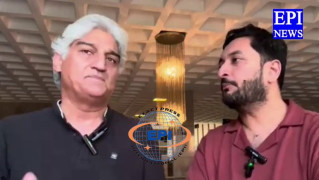Kamran Stu
MPA (400+ posts)
Why Pakistan matters
Washington Examiner
In his Monday evening speech on Afghanistan, President Trump signaled an about-face in U.S. policy towards Pakistan.
"We have been paying Pakistan billions and billions of dollars at the same time they are housing the very terrorists that we are fighting." Trump continued, "But that will have to change, and that will change immediately."
Since 2001, the U.S. government has attempted to apply a double-edged strategy with Pakistan. In public, it has used financial leverage, diplomatic engagement, and warm words in an attempt to persuade Pakistan to support U.S. counterterrorism priorities. In private, while the U.S. has occasionally used covert action to strike Pakistan-based terrorists, it has largely relied on Pakistan's Inter-Services Intelligence (ISI) agency to pursue that end. And unfortunately, the ISI is in bed with many of the same terrorists that the U.S. seeks to destroy.
Put simply, U.S. policy towards Pakistan has failed, and change is needed.
But what will Trump's tougher approach entail? Although the Washington Examiner's Tom Rogan has offered some ideas, at this point we simply don't know.
What we do know is that Pakistan is immensely important to U.S. national security. Most obviously, Pakistan is the ideological, financial, and training hub of many different Islamist terror groups. Were the U.S. to adopt an isolationist approach to Pakistan, the result would be the empowerment of organizations like the Islamic State and al Qaeda. The madrassas which represent the vast majority of Pakistani extremist viewpoints are dedicated to destroying American interests, and they won't quit even if we do.
There's another threat at stake here: Nuclear security. Pakistan isn't just one of the few global powers with an advanced nuclear weapon and ballistic missile capability, it's also the most unstable member of that club. While North Korea presently poses the greatest nuclear risk to U.S. interests, Pakistan is most vulnerable to collapse.
If the U.S. withdraws support for Pakistani moderates and reformers, the risk of their collapse will grow, and along with it, the probability of a nuclear holocaust. After all, witnessing a Pakistan led by fanatics in possession of nuclear weapons, India could even launch a pre-emptive nuclear strike against it. That might sound implausible, but India-Pakistan relations are notoriously hostile, based on border conflicts and Pakistan's support of terrorist groups who frequently attack India. Regardless, even a limited nuclear exchange would mean millions of deaths and a rapid collapse of global security.
And Pakistan also matters for reasons that go beyond the present. Around 53 percent of Pakistan's nearly 200 million citizens are 24 years old or younger, and most are poor and angry. If Pakistan is unable to develop its economy and civil society to better serve those young citizens, many will gravitate towards extremist ideologues who offer alternative aspirations. Pakistan's legions of extremist imams know that their empowerment rests on economic malaise and personal destitution. That's one reason why, for example, they are so hateful of women's empowerment. They know that if dispossessed citizens are able to contribute to Pakistan's better future, their hateful ideologies will diminish. For our own sake, the U.S. must empower reformists in improving Pakistan's economy and living standards.
Many Americans simply view Pakistan as a major headache. But ignoring its circumstances would be disastrous for U.S. security. We cannot and should not seek to make Pakistan in our image, but we should act to reduce rather than fuel the dangers that nation poses to us now and could pose to us in the future.
Source: Washington Examiner
Washington Examiner
In his Monday evening speech on Afghanistan, President Trump signaled an about-face in U.S. policy towards Pakistan.
"We have been paying Pakistan billions and billions of dollars at the same time they are housing the very terrorists that we are fighting." Trump continued, "But that will have to change, and that will change immediately."
Since 2001, the U.S. government has attempted to apply a double-edged strategy with Pakistan. In public, it has used financial leverage, diplomatic engagement, and warm words in an attempt to persuade Pakistan to support U.S. counterterrorism priorities. In private, while the U.S. has occasionally used covert action to strike Pakistan-based terrorists, it has largely relied on Pakistan's Inter-Services Intelligence (ISI) agency to pursue that end. And unfortunately, the ISI is in bed with many of the same terrorists that the U.S. seeks to destroy.
Put simply, U.S. policy towards Pakistan has failed, and change is needed.
But what will Trump's tougher approach entail? Although the Washington Examiner's Tom Rogan has offered some ideas, at this point we simply don't know.
What we do know is that Pakistan is immensely important to U.S. national security. Most obviously, Pakistan is the ideological, financial, and training hub of many different Islamist terror groups. Were the U.S. to adopt an isolationist approach to Pakistan, the result would be the empowerment of organizations like the Islamic State and al Qaeda. The madrassas which represent the vast majority of Pakistani extremist viewpoints are dedicated to destroying American interests, and they won't quit even if we do.
There's another threat at stake here: Nuclear security. Pakistan isn't just one of the few global powers with an advanced nuclear weapon and ballistic missile capability, it's also the most unstable member of that club. While North Korea presently poses the greatest nuclear risk to U.S. interests, Pakistan is most vulnerable to collapse.
If the U.S. withdraws support for Pakistani moderates and reformers, the risk of their collapse will grow, and along with it, the probability of a nuclear holocaust. After all, witnessing a Pakistan led by fanatics in possession of nuclear weapons, India could even launch a pre-emptive nuclear strike against it. That might sound implausible, but India-Pakistan relations are notoriously hostile, based on border conflicts and Pakistan's support of terrorist groups who frequently attack India. Regardless, even a limited nuclear exchange would mean millions of deaths and a rapid collapse of global security.
And Pakistan also matters for reasons that go beyond the present. Around 53 percent of Pakistan's nearly 200 million citizens are 24 years old or younger, and most are poor and angry. If Pakistan is unable to develop its economy and civil society to better serve those young citizens, many will gravitate towards extremist ideologues who offer alternative aspirations. Pakistan's legions of extremist imams know that their empowerment rests on economic malaise and personal destitution. That's one reason why, for example, they are so hateful of women's empowerment. They know that if dispossessed citizens are able to contribute to Pakistan's better future, their hateful ideologies will diminish. For our own sake, the U.S. must empower reformists in improving Pakistan's economy and living standards.
Many Americans simply view Pakistan as a major headache. But ignoring its circumstances would be disastrous for U.S. security. We cannot and should not seek to make Pakistan in our image, but we should act to reduce rather than fuel the dangers that nation poses to us now and could pose to us in the future.
Source: Washington Examiner
Last edited by a moderator:






























